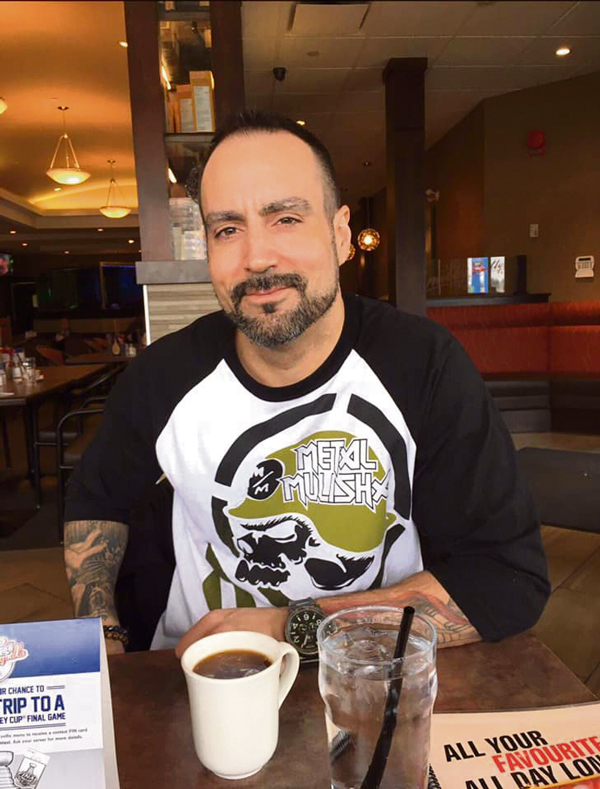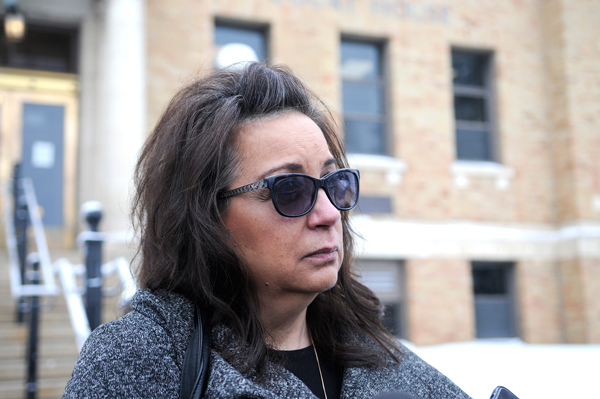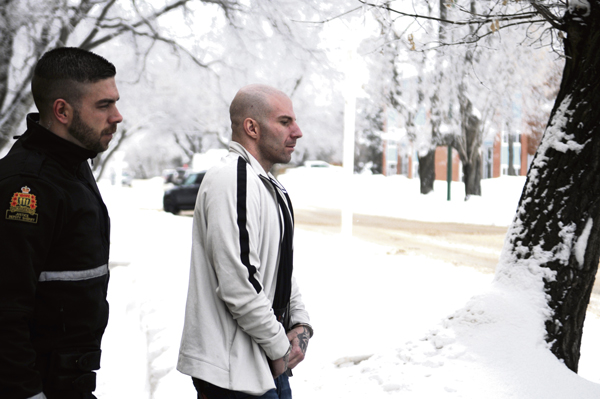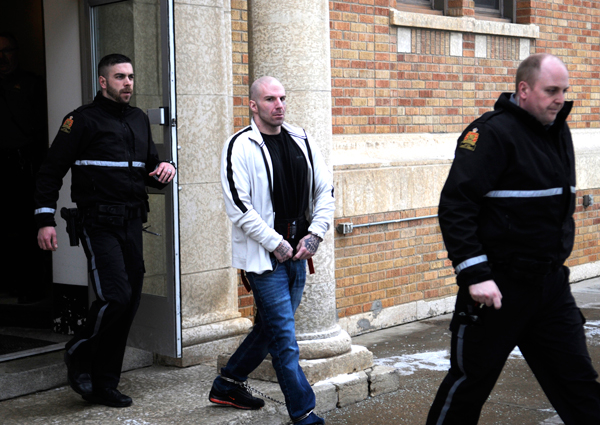
Tyler Vandewater will be 47 years old before he can even be considered for parole.
The 31-year-old was sentenced to life in prison with a parole ineligibility period of 16 years for the murder of his cellmate, Christopher Van Camp, at the Saskatchewan Penitentiary in June 2017. As he was serving a prison sentence at the time of the offence, he will not receive any credit for time served in remand.
Vandewater had been found guilty in March of this year. He had argued that he acted in self-defence, but Justice B. Scherman did not believe him.
Scherman said Van Camp was the victim of a “particularly violent, brutal, one-sided and sustained attack.”
Van Camp was found in his cell with more than 60 stab wounds, including 26 cuts or stabs to his head, five to his neck, and five to his upper left chest area. Van Camp also had 25 stab wounds on his back. Several stab wounds punctured his lungs, with two passing through his heart.
In addition to stabbing Van Camp multiple times on his chest and his back, Vandewater testified that he blacked out before finding himself stomping on his victim’s head as Van Camp lay pinned, not moving, between the wall and the cell toilet. The entire attack lasted mere minutes.
Vandewater then cleaned up the cell and hid Van Camp in the bottom bunk of their shared cell.
Van Camp had returned to the prison just hours before he was murdered by Vandewater. He had been arrested for violating his parole after overdosing in Calgary. He had only six months left in his sentence.
Lauren Laithwaite, Van Camp’s mother, said the time since her son’s death has been “a horrible nightmare.”

She knew little of the details before the trial. In her victim impact statement, read over the phone Friday, she said she had only been asked if she knew what a shiv was, and had been told her son was stabbed over ten times.
“I could not have prepared myself for what I heard at trial,” she said.
“I’m supposed to tell the court how this has affected me. I have received a life sentence. Horrific images I can never unsee. Flashbacks to the moments I received the call that Chris was gone. I hope one day I don’t have to see his death as a scene in a movie where he’s walking right into it.”
Laithwaite said Van Camp was her supporter, someone who was “so very good” at loving her. She had him as a teenager, and he was the catalyst for everything she ever accomplished, Laithwaite said.
“I have so much gratitude for the gift of him into my life,” she said.
“I lost a part of my heart that day. It’s unnatural for a parent to bury their child. It’s also unbearable to think of the way he died, and that he was alone. I take relief that he was probably unconscious for most of it.”
Laithwaite said she hopes Vandewater can be rehabilitated and one day not recognize the person who was capable of such violence. Still, she said, she has yet to see any emotion or remorse from him.
“Mr. Vandewater had a choice … to tell the truth. He did not,” Laithwaite said.
“A man with remorse would have told the truth.”
Laithwaite wasn’t the only family member to give tearful testimony Friday.
“This is a life sentence of grief and pain,” Van Camp’s father said. He said his whole family has dealt with mental and physical health difficulties from the stress caused by Christopher’s death.
“This is truly the worst thing that can happen to a father,” he said.
“I hope no other family has to suffer this grief like we’ve had to.”
Christopher’s stepmom also spoke, revealing that while the whole family has been hit hard, the one struggling the most might be Christopher’s sister.
“Anytime she has a milestone or celebration, she’s reminded that the one person she’d want to talk to about it is gone,” she said. “The grief overshadows any joy she feels.”
She read a victim impact statement written by Christopher’s sister.
“I feel useless and broken,” she wrote. “No one should have to lose their brother like this.”
What’s worse, Crown prosecutor Linh Le argued, is that the family may never know why this happened.
“What appears to be particularly troubling for the family is the lack of detail as to why the murder had occurred,” she said.
“This is what Mr. Van Camp’s family must live with.”
Le cited other instances of inmates murdered behind bars. She said in one incident, the convicted inmate received 16 years of parole ineligibility after stabbing another inmate five times.

Vandewater’s crime, she argued, was worse.
She walked the court through Vandewater’s history of violence. His first crimes, she said, came when he was just 12. He continued offending into 2019 with “no significant break,” earning 28 convictions, most of them violent.
His first federal sentence was a 2008 aggravated assault, where a man walking with his cousin was punched in the head and stomped on. The victim had to be airlifted to the hospital.
Then, in 2014, Vandewater stole a man’s truck. He approached to ask for directions before holding a pistol to the victim’s temple and driving away with the man’s phone and wallet. Vandewater fled from police before becoming stuck in a field. He then tried to run, but was caught.
Since that offence, most of Vandewater’s crimes, including three cases of aggravated assault, have been in the prison system. He committed a pair of aggravated assaults in 2016, first joining six other gang members in chasing an inmate down the prison range before beating and kicking him in the corner, then teaming up with another to pin and beat an inmate in the prison’s weight room.
Both of those incidents only stopped when guards intervened. He was sentenced in each case
Then, Le said, in 2019, while on remand at the Prince Albert Correctional Centre awaiting trial for killing Van Camp, Vandewater approached an inmate from behind and slashed his throat “for no apparent reason.” He received four years in prison for that crime.
In June of 2017, just prior to the attack on Van Camp, Vandewater completed a psychological assessment. He was assessed to be a “high risk” to re-offend generally or violently. The Correctional Services Canada psychologist wore that the likelihood of Vandewater committing a violent offence before his prison term ended is “quite high” given his history. In 2019, the likelihood of him taking accountability and being able to be reintegrated into society was ranked as “low.”
The report, Le said, found that there were no supervision programs in the community that would be able to manage Vandewater’s risk to the public.
In his submissions, defence lawyer Brian Pfefferle argued for 14 years of parole ineligibility. He cited the lower end of sentences in similar cases where inmates were involved in the killing of others.
He briefly walked through Vandewater’s history.
Vandewater’s mother left when he was young, and he was raised in a dysfunctional home by his father and stepmother, at times spending time in foster care or detention centres.
“This is an individual who has, for all intents and purposes, been raised by institutions,” he said.
“He admits to stealing for survival, which led to stealing for gain, and eventually, a lifestyle of criminality.”
Vandewater’s life has been characterized by “substance abuse, negative peers, a sense and need to belong, violence and federal incarceration,” Pfefferle said.
“That is a tragic summary of Mr. Vandewater’s life.”

Pfefferle said that, despite not pleading guilty, by acknowledging his actions and revealing his self-defence argument early on in the process, Vandewater spared as many resources as possible by admitting facts and disclosing his defence to shorten and focus his trial. Pfefferle asked the court to not consider Vandewater “as someone who has completely thumbed his nose at the process.”
He also said that just because parole could be possible does not make it automatic.
Vandewater would still have to demonstrate that he’s changed and have to apply to the national parole board.
“Someone who is sentenced to life does, in fact, usually … spend the rest of their life in custody unless changes are made,” Pfefferle said.
“What we’re hoping for is a just and peaceful society inside the institution or outside the institution. Having a carrot out there … to say there is some possibility with significantly improved behaviour that a person can apply for release, having that time period extend too far down the road can have a counter effect to creating that just and peaceful society.”
Pfefferle said his client stands by his version of events, and that he is remorseful.
“This is an individual he truly considered to be a friend,” Pfefferle said. “He will adamantly oppose any suggestion otherwise.”
Vandewater said that Van Camp was more than a friend.
“I did consider him my family,” he said.
“This is going to affect the rest of my life. It does hurt me that it did happen. I truly do have remorse. No one can say I don’t because I’m not crying. You can’t see it. I’m not one to show tears but I do have remorse and it does eat at me every day what happened,” he said.
“I truly do feel sorry for his family and what they have to go through for what happened and what I did.”
Scherman said if that is true — if Vandewater did see Van Camp as family — “This makes the offence and the extent of violence incomprehensible.”
He said there is “not one iota of evidence” that Van Camp offered any aggression or resistance, calling Vandewater’s actions “a particularly brutal murder.”
While he acknowledged Vandewater’s “unfortunate childhood,” he also said that many people have difficult childhoods and don’t “turn to a life of crime.”
What Scherman did find concerning was Vandewater’s “propensity for violence.”
He argued there is a case to go beyond the minimum 16 years in prison others have received for similar crimes. Still, he said, “there needs to be some carrot out there.”
Despite this, Scherman didn’t seem to have much hope.
“He doesn’t’ hold much promise he will change,” Scherman said of Vandewater. He settled, with some reservations, on 16 years of parole ineligibility, “in the hope there is some carrot there.”
“It may well be … that if he doesn’t change to turn his life around, the parole board could go beyond” those 16 years and see that Vandewater remains imprisoned for the rest of his life.
In addition to the life sentence, which begins today, Vandewater received a lifetime ban from owning any firearms. The payment of a victim surcharge was waived.
Pfefferle to appeal
Shortly after the sentencing, defence lawyer Brian Pfefferle confirmed the filing of a notice of appeal. Pfefferle cited two reasons for the appeal, saying Scherman “erred in not approaching his consideration of the evidence of self-defence or provocation” in an appropriate manner, and that the verdict was “unreasonable, relied upon inappropriate evidence, and was not supported by admissible evidence.”
Pfefferle argued that Scherman misapprehended the “prison culture” evidence called by the defence, downplaying the value it had in assessing the reasonableness of Vandewater’s perception of danger.
He also argued that Scherman relied on evidence outside of an expert witnesses’ area of expertise and was wrong in his conclusion that Van Camp was not suffering any sort of neurological or psychiatric distress as the evidence he relied on to make that finding was not something he could rely on.
Pfefferle is asking that the guilty verdict be set aside and a new trial ordered.
— With StarPhoenix files from Dave Deibert.

